The Hebridean brothers who ended up in the Vietnam War
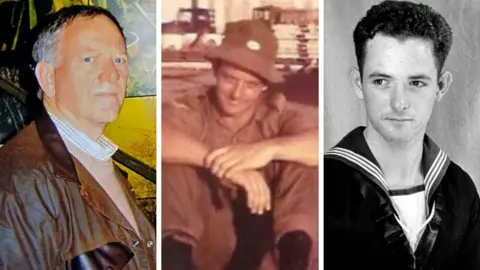 BBC
BBCWhen Neil, Donald and Ian MacDonald were children, they enjoyed a peaceful rural upbringing on the Hebridean island of Harris.
As young men, all three of them were thousands of miles away from their childhood home on the front line of the Vietnam War.
Fifty years after the end of the war, which resulted in the deaths of an estimated 3.8m people, the brothers' families have paid tribute to them.
This is how the Hebridean brothers who emigrated to Australia with dreams of a new life, ended up fighting alongside the Americans in Vietnam.
The brothers were among Donald and Elizabeth MacDonald's eight children who grew up on Harris in the 1940 and 50s.
Their sister Flora said they had a traditional upbringing.
"Our neighbours had a fishing boat and we would get fish from them," she said.
"My mother would put it in casks with salt. We also had hens and we dug our own peats for the fire.
"We didn't want for anything, and there was a strong community around us."
The family outgrew their small house in Geocrab and moved to Tarbert.
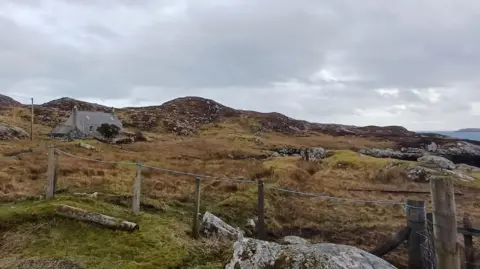
But as the children grew older, Donald and Elizabeth became concerned they would outgrow island life and seek new opportunities away from the Western Isles.
They decided to make the move as a family.
The MacDonalds first went to Glasgow in the late 1950s, before leaving for Australia in 1961.
Seven of the children joined their parents for this new life, with an older sister already having emigrated to South Africa.
They arrived as Ten Pound Poms - the nickname given to British emigrants who moved under an Australian government-backed scheme.
There was significant interest in Australia in the large family from the Hebrides.
Flora said: "Our family received a lot of attention from the media.
"They took pictures of us when we arrived, and then they came again to take pictures when we had found a house near Melbourne."
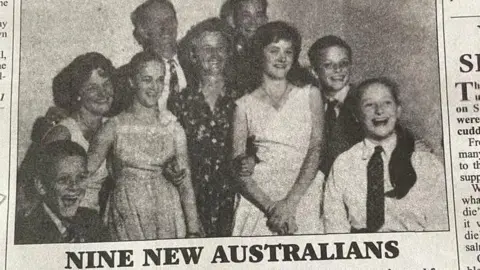
Meanwhile the US, fearing the spread of communism in South East Asia, was involved in Vietnam from the 1950s and began a full-scale military intervention in 1965.
Australia, an ally of the US in the region, lent their support by sending thousands of service personnel to Vietnam.
By this time Donald and Ian had joined the Australian army and Neil was in the navy.
For the brothers the military offered work and an opportunity to learn a trade.
"Donald joined the Australian army expecting to be able to take up an apprenticeship, as they had advertised," said his partner Geraldine Schirmer.
"His timing wasn't very good as they were needing more infantrymen.
"So he ended up being in an infantry battalion and was sent to Vietnam in early 1968."
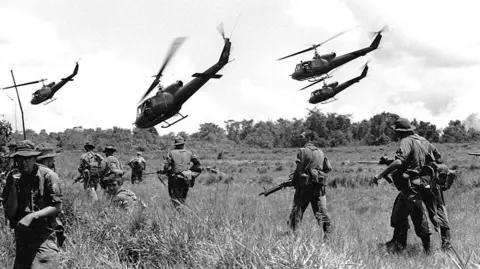 Getty Images
Getty ImagesFlora said her brothers being sent off to war was the cause of great concern for her parents, who had lived through World War Two.
"They had seen war," she said.
"They were particularly concerned about them being in another land that they knew nothing about."
"My brothers didn't know what they were going to be facing."
Donald was shot and wounded at the Battle of Coral-Balmoral in 1968.
Twenty-six Australians were killed and more than 100 were injured in fighting that lasted almost four weeks.
Ian, a Royal Engineer, visited Donald in the hospital.
Geraldine said: "He did this regularly and Donald would wonder why Ian would always be in tears.
"It was because the medics had told Ian that Donald was not likely to survive."
Donald spent two years recovering from his wounds, before returning to the army in a training role.
He later went into the construction industry and raised his own family.
Ian was deployed to Vietnam again in 1972, in the closing stages of Australia's involvement in the war.
He was on the last Hercules military aircraft transporting troops back to Australia later that year.
He went on to work as a civil engineer on the east coast of Australia and helped to run a roadside restaurant his wife had opened in Queensland.
He became unwell in 2008 and died as a result of cancer in 2012.
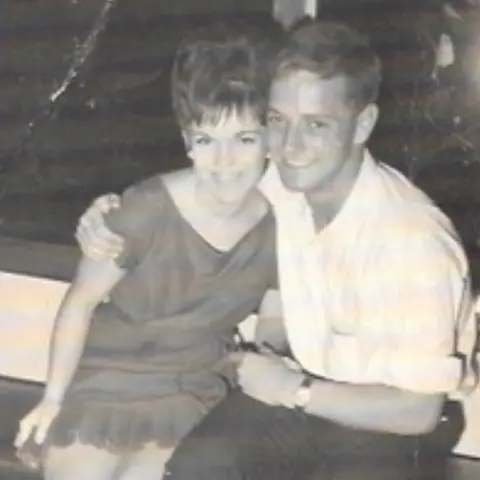 MacDonald family
MacDonald familyNeil worked as a truck driver and as a mechanical technician for food and drink company Cadbury Schweppes after the war.
Later, he went back to sea with the Royal Volunteer Coastal Patrol at Coffs Harbour in New South Wales.
He died in 2023 and his ashes were buried at sea outside Sydney harbour by the Australian Navy.
The war left its mark on all of the brothers.
Each of them suffered from post traumatic stress disorder (PTSD) due to their wartime experiences.
Neil developed Ménière's disease, an inner ear condition that led to deafness and forced him to retire from full-time work in 1982.
And at the age of 60, another effect became apparent for Donald.
Geraldine said: "It was a blood disease - a disease of thrombosis in its first stages.
The illness was linked to Donald's exposure to the chemical Agent Orange in Vietnam.
It was used as a defoliant sprayed by US forces to destroy jungles and uncover the enemy's hiding places.
It contained dioxin, a highly toxic chemical that has been linked to increased rates of cancers and birth defects.
Donald died as a result of his illness in 2023.
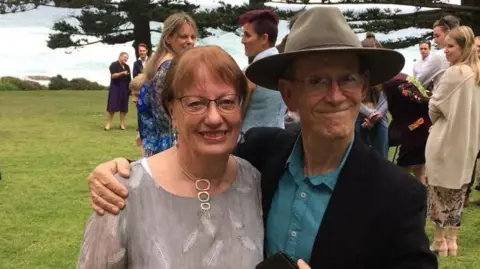 Geraldine Schirmer
Geraldine SchirmerIn the years before their deaths, all three brothers reconnected with their native island.
Ian came back with his wife Robyn in 2005.
"When we pulled into the ferry terminal at Tarbert, the tears were just streaming down his face," she said.
"He was thrilled to be back in Harris".
Donald came home for a family trip to Pabbay, the island off Harris from which one side of his father's family came, in 2010.
He returned several times over the following 10 years.
During one of those trips he and other members of Ian's family buried some of his ashes at Scarista cemetery.
Donald asked that some of his ashes also be scattered in Harris.
"His heart was in Harris," said Geraldine.
"That's where his roots were. It was home to him."
